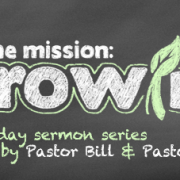Your mission, should you choose to accept it…
Last night, my wife, Dianna, and I saw the latest Mission Impossible film. The Mission Impossible franchise is based on an orginazation called IMF (Impossible Missions Force) that embarks on the kind of missions that nobody else can do. Ethan Hunt and the other agents are presented with missions using the phrase “Your mission, should you choose to accept it…” If they accept that mission, then they set out to do the impossible. They set out to do what no other group can do. They are missional. They are on mission.
If you want to sound hip and cool, just tell people that your church is missional. Actually, I like the term missional. In fact, I really like it. It’s fresh sounding and provocative. It also implies that the church has a mission. But unfortunately it seems that there are numerous definitions to this term. In telling our church that we are called to be “on mission”, I must underline what we mean by mission, lest I fail to clearly communicate our mission.
For many when they hear missional, they think social, you know soup kitchens, taking care of widows, stopping sex trafficking, helping people become better stewards of their finances… This is not what I mean by mission. This isn’t to say that these things are unimportant. I would say that these are important, even commanded in Scripture. But when we make these things the mission of the church, we then define the mission ourselves.
To help us gain an understanding of biblical mission, we need to understand the word mission. “Mission” is from the Latin word missio which means “sending”. It is a sending. In other words, if we are on mission, then we are sent, and the question is who sent us? Jesus’ words in John 20:21 are a clue; we are sent by Jesus, as Jesus was sent by the Father. In other words, Jesus defines our mission. After Jesus commissions his followers, he begins to reveal to them what the mission is. The mission is the forgiveness of sins (John 20:23). We know Jesus is the one who saves. Jesus isn’t implying that we go on our own rescue mission. We join him in his rescue mission. The mission of God is to bring people into a right relationship with God. Our mission then is to serve his mission.
When we make the mission social, we strip away the distinctiveness of God’s saving work. The mission God gives the church is unique. It is our Mission Impossible. The mission has to do with declaring God’s saving work to a lost world. If the mission were social, there is nothing unique about God’s mission. The church’s mission becomes just like anyone else’s. Here’s a question. If it can be done without Christ, can it be God’s mission for the Church?
The fruit of a people in alignment with God’s heart, being changed by his grace will be love for neighbour and pursuit of moral purity. These things are not the mission, but they spring forth from missionaries (people on mission).
We are not on Christ’s mission, if our mission is soup kitchens. But, it must be said that if we are on Christ’s mission, we will care about hungry people. Why? Is God’s great plan to feed people food? No, Jesus rebuked the crowd that followed him for physical food (John 6:26). But because God’s mission of salvation is fuelled by his love for those he created in his image, so too, we should actively love people. So our social action is not the mission, but accompanies it.
For some, this may seem like semantic chicken and egg stuff, but we need to get this right. The particular mission of Jesus for the church is to preach the forgiveness of sins (Acts 13:38). No charity, no club, no philanthropist can carry forth this mission. However, if we are on Christ’s mission, we are going to love people in their deep needs (social) as well as their deepest need (spiritual). But if we lose the cutting edge of Christ’s mission, we are no different from any other charity or club. Our mission is impossible for man, but possible from God.










